Authentic Italian Amatriciana Sauce with Pasta (Bucatini)
Jun 30, 2021, Updated Jul 02, 2024
This post may contain affiliate links. Please read our disclosure policy.
Make Authentic Italian Amatriciana Sauce in less than 30 minutes. This is a recipe you don’t want to miss! A classic Italian pasta dish to add to your favorites.
More classic Italian pasta recipes: Authentic Cacio e Pepe Recipe (Best Tips), Authentic Italian Pasta Carbonara (no cream), Spaghetti with Tomato Paste Sauce, and Authentic Italian Spaghetti all Puttanesca Recipe. Bring a taste of Italy to your table and share this easy pasta dish with family and friends!
Make sure to read: How Long to Boil Spaghetti Pasta Perfectly Every Time to elevate this dish even more!
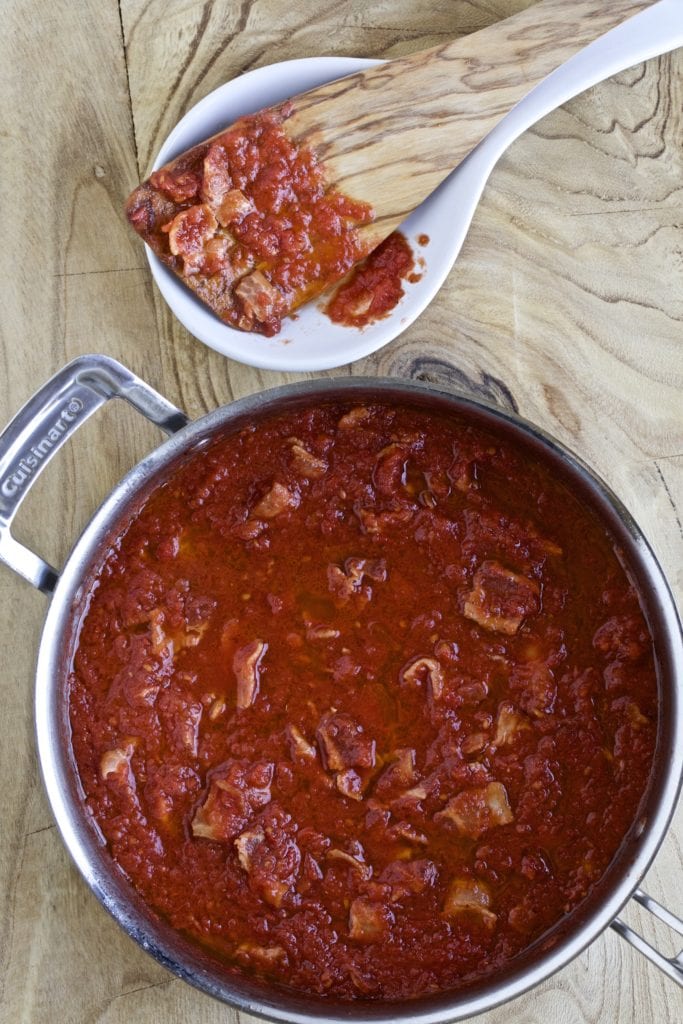
Why this recipe works
This classic sauce takes its spiciness from black pepper and its depth of flavor from guanciale, Italian salt-cured pork.
If you can’t find guancile, use pancetta, or bacon. The San Marzano tomatoes create a rich, deep, and flavorful sauce.
Using Pecorino Romano cheese is a must in this authentic Roman dish. It is a recipe you will make time and time again for its simple and lovable nature.
Add this to your meal plan this week!
What makes this dish so wonderful is its use of simple ingredients with super flavorful results, making it perfect for guests, while keeping things relaxed and easy.
Table of Contents
Simple Ingredients
This simple pasta dish only requires a few pantry staples.
- Tomatoes in pulp
- Guanciale, pancetta, or thick cut bacon
- Spaghetti ot bucatini pasta
- Pecorino Romano Cheese
- Salt and Pepper to taste
- Red pepper flakes (optional)
See quantities on recipe card.
How to make Authentic Italian Amatriciana Sauce with Pasta (Bucatini)
Making amatriciana sauce with pasta is simple and requires little effort and time.
1- Heat a large pan over a high heat. Add guanciale/pancetta or bacon pieces and red chili flakes (if using), and stir fry until all the fat has been rendered out and the meat is very crisp. Scrape bottom of pan often to prevent from sticking.
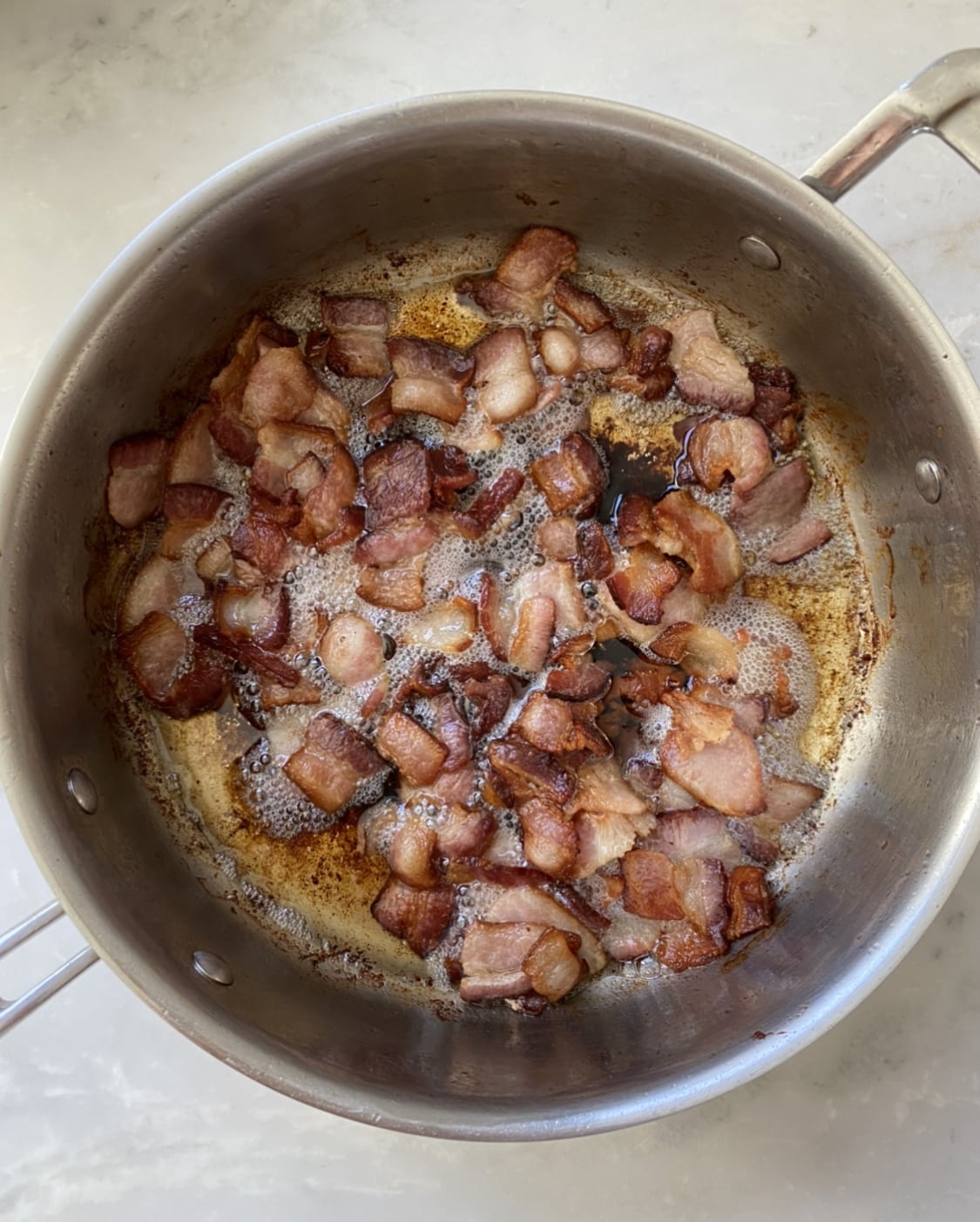
2- Add the canned tomatoes to the pan. Stir everything through then reduce heat to low and simmer for a few minutes.
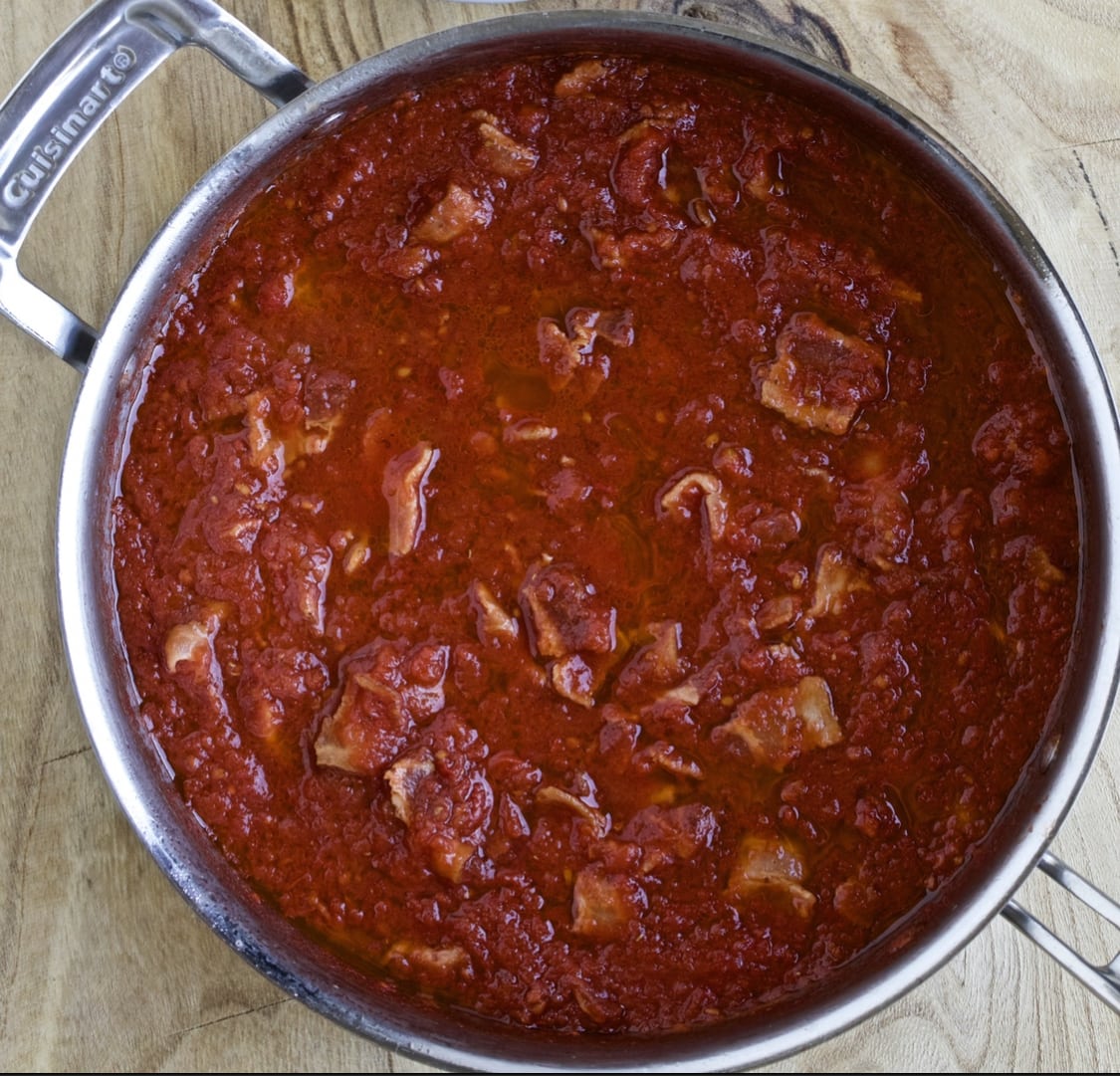
3- Meanwhile, bring a large pot of cold water to a boil and add salt to taste. Add the pasta and cook until al dente, according to package instructions. Reserve 1/2 cup of pasta water.
Make sure to use the right pasta tool to stir the pasta. Drain pasta and add to skillet with sauce.
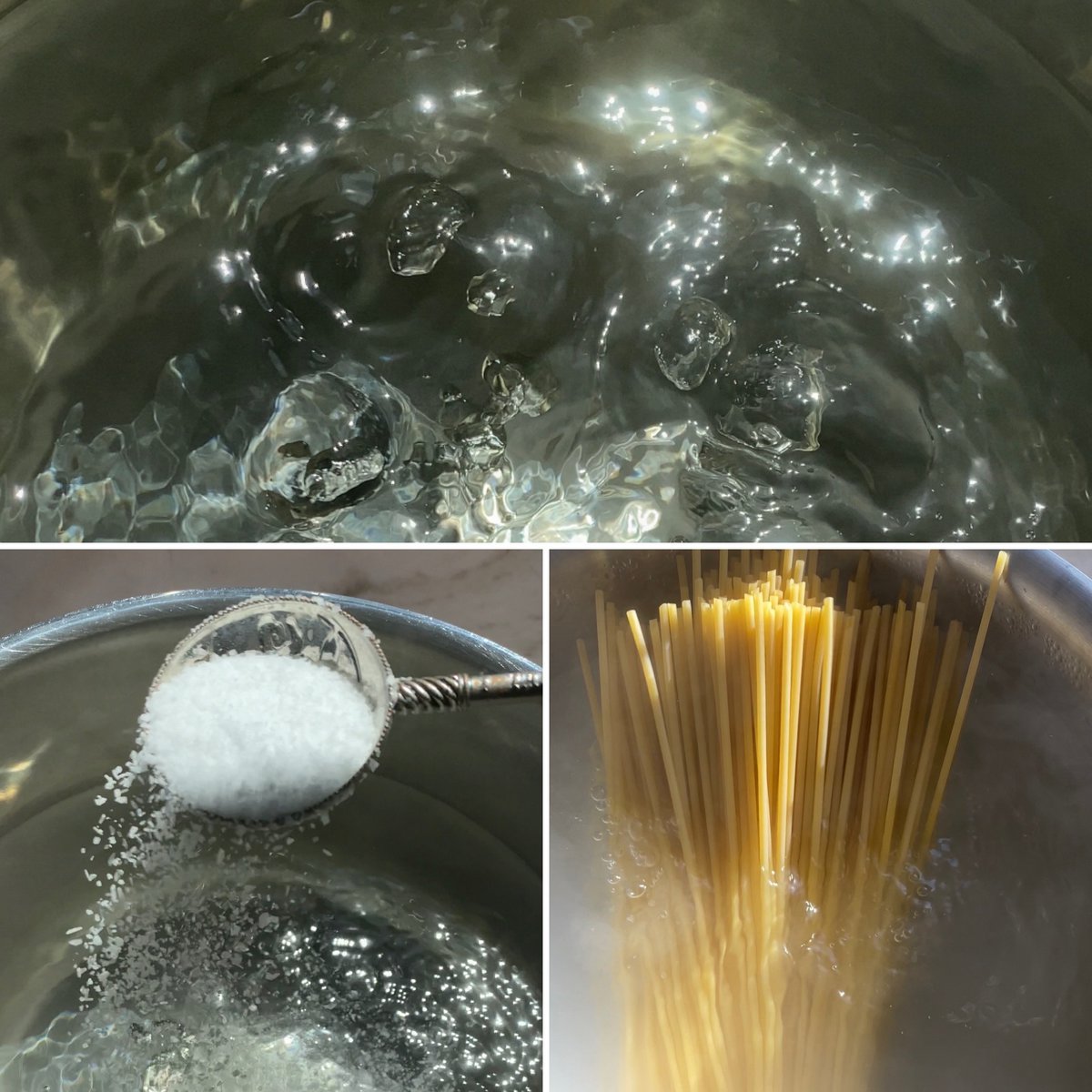
4- Place the drained pasta on top of the sauce in the pan. Add half of the cheese and stir the pasta with the cheese without mixing with the sauce, yet. Stir to combine pasta water, the sauce, and pasta. Add the rest of the cheese.
5- To serve, portion out the pasta into serving bowls, top with plenty of freshly grated pecorino cheese. Mangia! (eat!)
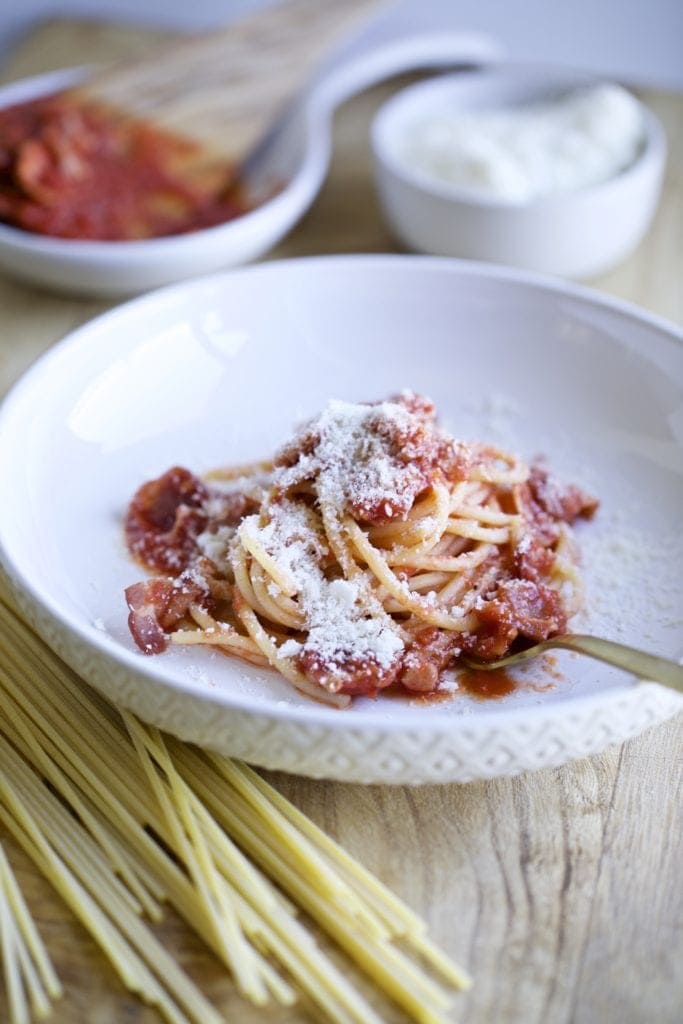
What is Amatriciana Sauce?
Amatriciana sauce is a simple peasant dish. Sugo all’amatriciana, or alla matriciana, also known as salsa all’amatriciana, is a traditional Italian pasta sauce with a few simple ingredients: guanciale, pecorino romano cheese, and tomato sauce.
Any other ingredients added are simply not in the authentic recipe. This recipe is a simple peasant sauce that dates back centuries. For example, you won’t find garlic in this recipe. If you love it- you can certainly add it!
I love this recipe for its humble and filling nature.
Italians pride themselves on simple, yet, satisfying and delicious food. This is one of those recipes that checks all the boxes!
History
Amatriciana originated in the green pastures on the hills overlooking Amatrice. Shepherds used to bring cheese and pieces of pork jowl with them during long days away from home. They would cook them in an iron pan, and add the pasta and cheese to make a simple and fast meal.
This is the original dish now known as white amatriciana. Since that time period, the recipe developed and changed a bit to add tomato sauce, making it a red base.
I prefer it with the red sauce, but I’ve always been curious to try it the other way. In a way it reminds me of Authentic Cacio e Pepe Recipe (Best Tips).
Authentic Amatriciana Sauce
According to officials in Amatrice, there are six ingredients that make up a real amatriciana: guanciale (pork jowl), pecorino cheese, white wine, tomatoes from San Marzano, pepper and chili.
You won’t find extra olive oil in the pan, onions, garlic, or other types of cheese. This recipe stays true to the true Roman authentic Amatriciana way!

One rule you absolutely can’t break is adding parmigiano instead of pecorino! Shhh, if you do I won’t tell the Italian officials.
I’ve tried it both ways and I agree that the pecorino adds a unique and distinct flavor that you can’t find using any other cheese.
Pasta Variety
The classic shape of pasta for amatriciana sauce is bucatini, a sort of long-shaped pasta, rounded with a tiny hole in the middle.
Bucatini is a shape typical of the Lazio region, so they pair perfectly with this sauce.
You can also use spaghetti. Spaghetti derives its name from the Italian word “spaghetto”, which means thin string. It work beautifully for this easy pasta dish.
You can also use short pasta varieties such as rigatoni, if you prefer. For more suggestions on what pasta shapes go well with what sauce read this article.
Variations
Every traditional recipe has many variations, and this happens also for this traditional recipe of pasta Amatriciana.
The variations are characterized by the addition or replacement of the ingredients according to the traditions of different Italian regions or simply to your personal tastes.
- Replace the pecorino it with parmigiano cheese or use half parmigiano and half pecorino romano.
- Use Bacon. Amatriciana sauce is often made with bacon, as is the case with Authentic Italian Pasta Carbonara (no cream). To learn more about the Carbonara recipe, read this article! If only for the easy availability of the ingredient, which is indeed also less expensive than guanciale.
- Garlic and Onion. Many people like to cook the cured meat with a clove of garlic or a small onion. This is used a lot in Rome and surroundings. The traditional Amatriciana recipe doesn’t approve, but in the end do what you love!
Top Tips
- Make your own Pasta – Make a full night of it by making your own pasta to pop into the dish!
- Al Dente Pasta – For the perfect al dente pasta, cook the pasta for a couple minutes less than the recommendation on the packet. For precise instruction read this post.
From My Cucina to your Table. Mangia! Mangia! (Eat!)
Made with Amore, Elena
More Delicious Recipes for YOU
Italian Style Pasta Salad Recipe (with Arugula)
Creamy Mushroom and Spinach Pasta (Video)
Roasted Peppers in oil with Garlic with Pasta
Penne Pasta and Peas Recipe with Mascarpone
Lemon Ricotta Pasta (with capers) 20 minute meal
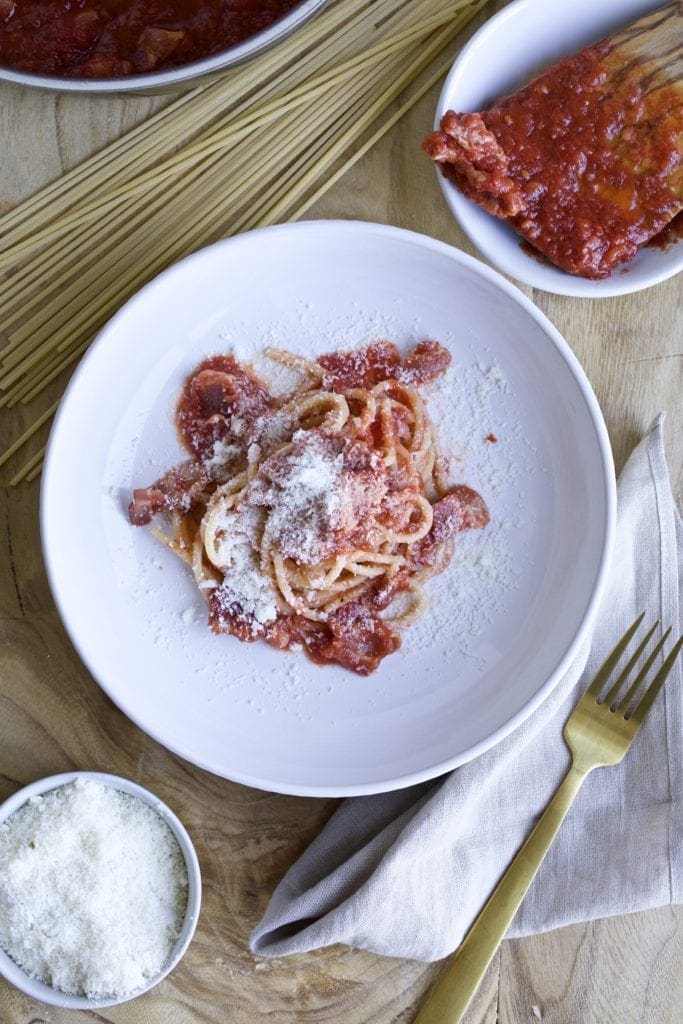
Guanciale and pancetta are different sections of pork meat. Guanciale is from the jowl and pancetta is from the belly.
Amatriciana and arrabbiata are tomato-based sauces. Amatriciana has guanciale or pancetta. Arrabbiata typically includes garlic and parsley and not meat, an authentic amatriciana sauce does not.
💙 MADE THIS RECIPE AND LOVED IT? 💙 Please leave a ⭐️STAR rating and COMMENT below- I love connecting with you! Tag me with your creations on Instagram and find me on Pinterest.
Print
Authentic Italian Amatriciana Sauce (Sugo All’amatriciana)
- Total Time: 25 minutes
- Yield: 4–6 servings 1x
Description
This is a recipe you don’t want to miss. This classic sauce takes its spiciness from black pepper and dried chiles and its depth of flavor from guanciale, Italian salt-cured pork. Add this to your meal plan this week!
Ingredients
- 28 oz can chopped tomatoes in pulp
- 12 oz guanciale, pancetta, or thick cut bacon (if using bacon add a little oil to pan)
- 1 lb (454 grams) spaghetti ot bucatini pasta
- 1 cup (8 oz) Pecorino Romano Cheese
- Salt and Pepper to taste
- 1/2 teaspoon red pepper flakes (optional)
Instructions
- Cut the guanciale, pancetta or bacon into chunks less than one-half inch thick.
- Heat a large pan over a high heat. Add guanciale/pancetta or bacon pieces and red chili flakes (if using), and stir fry until all the fat has been rendered out and the meat is very crisp. Scrape bottom of pan often to prevent from sticking.
- Add the canned tomatoes to the pan. Stir everything through then reduce heat to low and simmer for a few minutes.
- Meanwhile, bring a large pot of cold water to a boil and add salt to taste. Add the pasta and cook until al dente, according to package instructions. Reserve 1/2 cup of pasta water. Drain pasta and add to skillet with sauce.
- Place the drained pasta on top of the sauce. Add half of the cheese and stir the pasta with the cheese without mixing with the sauce, yet. Add pasta water and stir to combine the sauce and pasta. Add the rest of the cheese.
-
To serve, portion out the pasta into serving bowls, top with plenty of freshly grated pecorino cheese.
- Prep Time: 5 min
- Cook Time: 20 min
- Category: Savory
- Method: Italian
- Cuisine: Italian
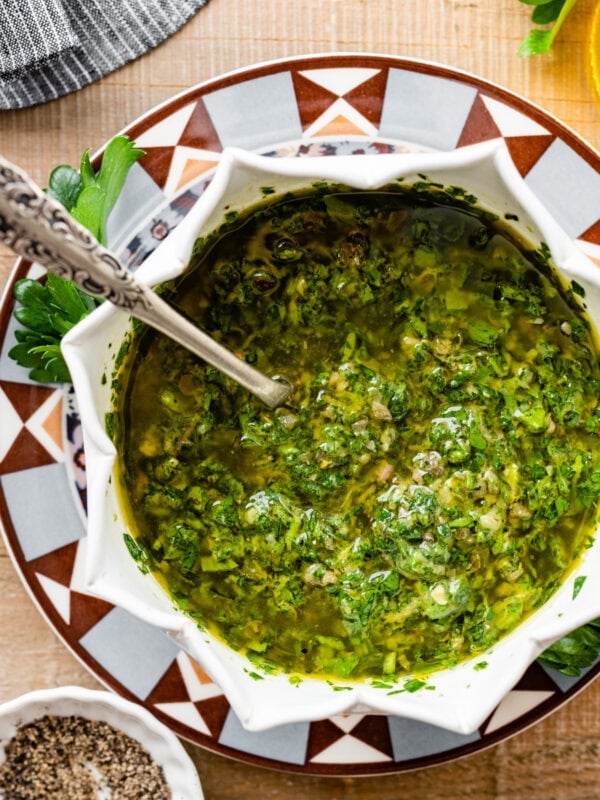
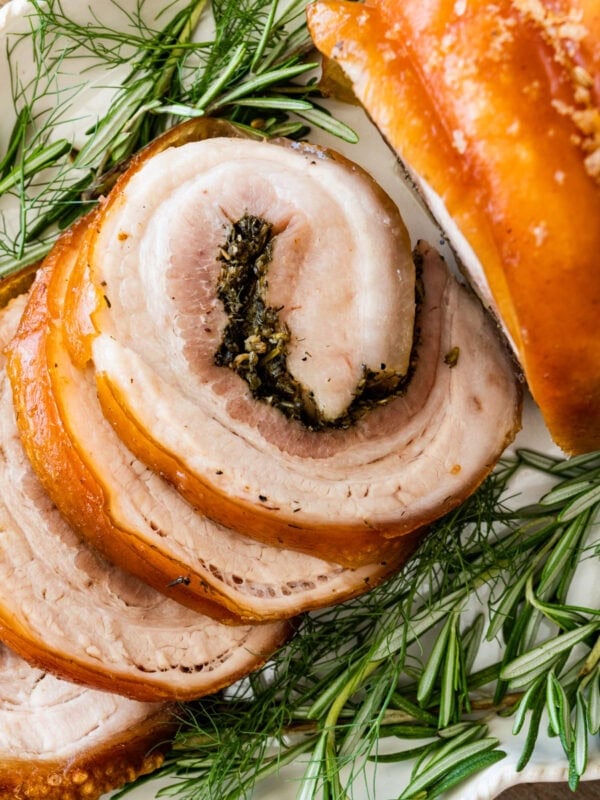






Delicious! Easy! Authentic! Tastes exactly like the Amatriciana we had in Rome. I’m going to double it for family coming over and I hope it tastes just as good. Elena, you are my go to Italian chef!
Yes! So happy you loved the recipe! You can totally double the recipe.
This has become one of our families go to recipes. It’s quick enough for weeknights and delicious enough for dinner parties! So simple and yummy!
Thank you, Molly. It is a family favorite in out house too. Enjoy!
This recipe is so delicious! It is an easy recipe that comes together so quickly. I didn’t make any adjustments to the recipe and it turned out perfect.This meal puts the biggest smile on my face. I love the simplicity of Elena’s recipes and how comforting they are. I really hope she will come out with a cookbook soon.
Hi Rae! So happy you loved the recipe! Yes, I hope to write a cookbook in the future :).
Simplicity is the true sense and heart of Italian cooking 🙂
Good morning Elena, do you have a sauce for ravioli, from the Genoa area? Thank you. Rich.
Hello, yes, you can try my classic pesto Genovese.
My wife and I spent a month in Italy over the summer and I ate sugo all’ Amatriciana 2-3 times a week while we explored central Italy. I was sad to come home thinking I would have to wait till next summer when we returned to Italy till I could enjoy one of my favorite meals. I then discovered you and all your delicious recipes and it took me back to all those authentic family restaurants we visited during our travels. Thank you and your Nona’s for sharing a little bit of Italy with those of us that wish we were still in Italy and were a little bit Italian.
Hi Michael, it sounds like you had a fantastic summer in Italy! It is a pleasure to share my Italian recipes with you. I hope to bring a taste of Italy to your home with many classic Italian recipes. Enjoy!